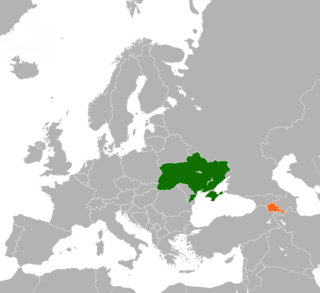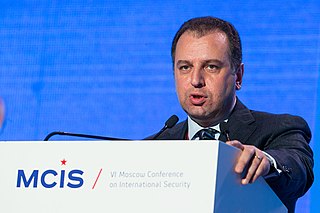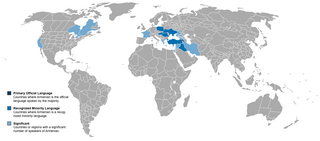
Armenia has maintained a policy of complementarism by trying to have positive and friendly relations with Iran, Russia, and the West, including the United States and the European Union since its independence. It has full membership status in a number of international organizations and observer status, etc. in some others. However, the dispute over the Armenian Genocide of 1915 and the recent war over Nagorno–Karabakh have created tense relations with two of its immediate neighbors, Azerbaijan and Turkey.

Seychelles follows a policy of what it describes as "positive" nonalignment and strongly supports the principle of reduced superpower presence in the Indian Ocean. The Seychelles government is one of the proponents of the Indian Ocean zone of peace concept and it has promoted an end to the United States presence on Diego Garcia. The country has adopted a pragmatic policy, however, and serves as an important rest and recreation stop for US ships serving in the Persian Gulf and Indian Ocean. Seychelles' foreign policy position has placed it generally toward the left of the spectrum within the Non-Aligned Movement. Russia, the United Kingdom, France, India, the People's Republic of China, Libya and Cuba maintain embassies in Victoria.

The Republic of Guinea-Bissau follows a nonaligned foreign policy and seeks friendly and cooperative relations with a wide variety of states and organizations. France, Portugal, Angola, Brazil, Egypt, Nigeria, Libya, Cuba, the Palestine Liberation Organization, and Russia have diplomatic offices in Bissau.

The Republic of Artsakh is a republic with limited recognition in the South Caucasus region. Republic of Artsakh controls most of the territory of the former Nagorno-Karabakh Autonomous Oblast and some of the surrounding area. It is recognized by only three other non-UN member states, Abkhazia, South Ossetia and Transnistria. The rest of the international community recognizes Artsakh as part of Azerbaijan. In November 2012, a member of Uruguay's foreign relations committee stated that his country could recognize Nagorno-Karabakh's independence. In 2012, Armenia and Tuvalu established diplomatic relations and it was perceived that Tuvalu may recognize Nagorno Karabakh’s independence. Also in 2012, the Parliament of New South Wales, an Australian state, called upon the Australian government to recognise Nagorno-Karabakh. In September 2014, the Basque Parliament in Spain adopted a motion supporting Nagorno-Karabakh's right to self-determination.

Armen Sarkissian is an Armenian physicist, computer scientist and politician, who currently serves as the incumbent President of Armenia. He served as Prime Minister of Armenia from 4 November 1996 to 20 March 1997 and previously was the country's (longest-serving) ambassador in London since 1998. Sarkissian assumed the presidency on 9 April 2018.

Ukraine–Armenia relations refers to the bilateral diplomatic relations between Ukraine and the Republic of Armenia. Diplomatic relations were established on December 25, 1991. Currently, Ukraine has the 5th largest Armenian community in the world.The Embassy of Armenia in Kiev opened in 1993. The Embassy of Ukraine in Yerevan opened in 1996. The current Ambassador of Armenia to Ukraine is Andranik Manukyan. The current Ambassador of Ukraine to the Armenia is Ivan Khukhta.

Edward Nalbandian is a prominent Armenian diplomat. He was the 7th Minister of Foreign Affairs of Armenia and served in that capacity from April 2008 to May 2018.

The Ministry of Foreign Affairs of the Republic of Armenia is a state body of executive power, which elaborates and implements the foreign policy of the Government of the Republic of Armenia, organizes and manages diplomatic service.

Armenia–Bulgaria relations are foreign relations between Armenia and Bulgaria. Both countries have had diplomatic relations since they were established in 1992. Armenia has an embassy in Sofia; since December 19, 1999, Bulgaria has an embassy in Yerevan. Both countries are full members of the Organization of the Black Sea Economic Cooperation.
Mnatsakanyan or Mnatsakanian is an Armenian surname. Notable people with the surname include:

Arman Kirakossian is an Armenian diplomat and historian. As of November 2014, he serves as Ambassador of Armenia to Austria as well as Ambassador to the Organization for Security and Cooperation in Europe (OSCE) and International Organizations in Vienna.

Vigen Sargsyan is an Armenian politician, and ex-Defence Minister of Armenia, serving from October 2016 until May 2018. He is not related to either the former President of Armenia Serzh Sargsyan or the former Prime Minister Tigran Sargsyan. He left office at his own accord after the newly appointed Prime Minister Nikol Pashinyan promised to fire him. Later Sargsyan said that he would continue to act as defence minister until a new minister is appointed.

Levon Mnatsakanyan is a politician, and a former Minister of Defence of Artsakh. He was born in Stepanakert in 1965 to an Armenian family. Mnatsakanyan began his military service in 1983 when he moved to the Belarusian SSR to work in the Soviet Army's Belarusian Military District. In 1989, he graduated with honors from the Karl Marx Institute of Polytechnic. During the period after the Soviet Union fell apart when Armenia began to build up its military, Mnatsakanyan served in artillery units in the Artsakh Defense Army and the Armed Forces of Armenia. He graduated from the Military Academy of the General Staff of the Armed Forces of Russia in 2005, which resulted in him returning to Artsakh later that year to become the deputy commander of the defense army. He was appointed by President Bako Sahakyan in 2015 as defense minister, a position he served in for just over 3 years before he was replaced in December 2018. He is currently married and has three sons.

The Ministry of Defence of Artsakh is a government agency of the partially recognized Republic of Artsakh. It is the executive body in implementing defense policies of the Artsakh Defense Army. The current Minister of Defense is Major General Karen Abrahamyan.

The following lists events that occurred in 2018 in Armenia.
















